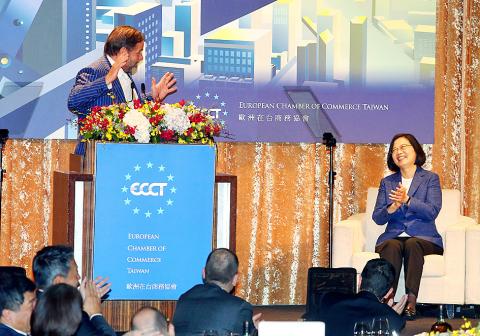The European Chamber of Commerce Taiwan (ECCT) on Wednesday night called on the government to show greater resolve in building the nation into a regional hub for the development of offshore wind energy.
“Wind energy has the potential to increase energy security, reduce pollution and create a new high-value industry in Taiwan,” Taiwan ECCT chairman Giuseppe Izzo said during an annual dinner with top-ranking government officials and industry representatives.
However, the government must keep a stable, consistent and predictable regulatory framework to boost business confidence in the industry’s sustainability, he said.

Photo: CNA
Hurdles and bottlenecks that need to be overcome include grid connections, finance, insurance, vessels, infrastructure and talent recruitment, he said.
Localization requirements must be flexible enough to allow time to build facilities, training staff and ramping up production without raising costs, causing delays or compromising safety and quality standards, he said.
Developers should also be allowed to adjust their plans to take advantage of the latest technology when it becomes available, he said.
More could be done to remove discriminatory treatment toward foreign residents in Taiwan, Izzo said.
He cited various benefits, such as transportation discounts for pensioners and disabled people, as well as subsidies for electric vehicles, that have not been extended to foreign residents.
“Foreigners who live, work and pay taxes in Taiwan should be granted the same rights and privileges due Taiwanese,” he said.
On the subject of healthcare, Taiwan’s health insurance system is facing challenges from a low birthrate and rapidly aging society, Izzo said.
The resulting increase in chronic diseases is putting a strain on resources, he said.
He pressed for further investment in disease prevention and adoption of more flexible business models to increase private sector involvement in healthcare.
ECCT reiterated its support for the government’s efforts to turn Taiwan into a bilingual nation by 2030 and the goal to boost English proficiency to enhance the nation’s competitiveness on the world stage.

CHIP RACE: Three years of overbroad export controls drove foreign competitors to pursue their own AI chips, and ‘cost US taxpayers billions of dollars,’ Nvidia said China has figured out the US strategy for allowing it to buy Nvidia Corp’s H200s and is rejecting the artificial intelligence (AI) chip in favor of domestically developed semiconductors, White House AI adviser David Sacks said, citing news reports. US President Donald Trump on Monday said that he would allow shipments of Nvidia’s H200 chips to China, part of an administration effort backed by Sacks to challenge Chinese tech champions such as Huawei Technologies Co (華為) by bringing US competition to their home market. On Friday, Sacks signaled that he was uncertain about whether that approach would work. “They’re rejecting our chips,” Sacks

NATIONAL SECURITY: Intel’s testing of ACM tools despite US government control ‘highlights egregious gaps in US technology protection policies,’ a former official said Chipmaker Intel Corp has tested chipmaking tools this year from a toolmaker with deep roots in China and two overseas units that were targeted by US sanctions, according to two sources with direct knowledge of the matter. Intel, which fended off calls for its CEO’s resignation from US President Donald Trump in August over his alleged ties to China, got the tools from ACM Research Inc, a Fremont, California-based producer of chipmaking equipment. Two of ACM’s units, based in Shanghai and South Korea, were among a number of firms barred last year from receiving US technology over claims they have

It is challenging to build infrastructure in much of Europe. Constrained budgets and polarized politics tend to undermine long-term projects, forcing officials to react to emergencies rather than plan for the future. Not in Austria. Today, the country is to officially open its Koralmbahn tunnel, the 5.9 billion euro (US$6.9 billion) centerpiece of a groundbreaking new railway that will eventually run from Poland’s Baltic coast to the Adriatic Sea, transforming travel within Austria and positioning the Alpine nation at the forefront of logistics in Europe. “It is Austria’s biggest socio-economic experiment in over a century,” said Eric Kirschner, an economist at Graz-based Joanneum

BUBBLE? Only a handful of companies are seeing rapid revenue growth and higher valuations, and it is not enough to call the AI trend a transformation, an analyst said Artificial intelligence (AI) is entering a more challenging phase next year as companies move beyond experimentation and begin demanding clear financial returns from a technology that has delivered big gains to only a small group of early adopters, PricewaterhouseCoopers (PwC) Taiwan said yesterday. Most organizations have been able to justify AI investments through cost recovery or modest efficiency gains, but few have achieved meaningful revenue growth or long-term competitive advantage, the consultancy said in its 2026 AI Business Predictions report. This growing performance gap is forcing executives to reconsider how AI is deployed across their organizations, it said. “Many companies